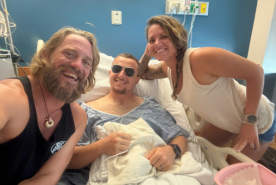October 21, 2025
Thinking about kidney donation? Discover what could affect your eligibility and find resources to guide you through the process.
Donating a kidney is one of the most generous gifts a person can give. For people with kidney failure, a transplant from a living donor often leads to better outcomes and a longer, healthier life compared to dialysis. But not everyone who wants to donate is eligible.
Here are five common reasons you might not be able to donate a kidney.
1. Serious Medical Conditions
Your health is the top priority when it comes to living donation. Medical conditions that could harm you during or after surgery will disqualify you.
Disqualifying medical issues include having:
- Uncontrolled high blood pressure or diabetes
- Active cancer or a recent history of cancer
- A serious heart or lung disease that makes surgery unsafe
However, you may still be considered for some conditions with proper treatment or better management. The transplant team will talk to you more about this before or during your evaluation.
2. Weight and BMI Considerations
Transplant centers often use body mass index (BMI) to screen donors. Some rely on strict BMI cut-offs. Others also consider overall health, lifestyle, and body fat distribution (central adiposity).
BMI categories include:
- Being underweight (BMI less than 18.5)
- Having a normal weight (BMI 18.5–24.9)
- Being overweight (BMI 25–29.9)
- Having obesity (BMI 30 or higher)
Having a low or high BMI can increase the risk of complications during and after the surgery, including bleeding, infection, or wound issues.
Higher weight is also linked to long-term health risks such as diabetes and high blood pressure.
3. Mental Health and Emotional Readiness
Donating a kidney isn’t just a medical decision. It’s also an emotional one. That's why the evaluation process includes meeting with a social worker or psychiatrist, who will discuss the emotional aspects of donating a kidney with you in more detail.
The mental health professional helps make sure you:
- Understand the risks and benefits of donation
- Feel confident that you’re not pressured to donate without pressure
- Have been doing well on mental health medications and have been stable for a period of time
Having a mental health diagnosis doesn’t automatically disqualify you. What matters is whether you’re receiving support and care to make the decision safely.
Subscribe today!
Join the NKF Blog Newsletter
Get inspirational stories and kidney disease resources delivered to your inbox every month. You'll gain practical insights and expert advice to help you better understand and manage your kidney health, no matter where you are on your kidney journey.
4. Support System and Recovery Needs
A full recovery after kidney donation surgery usually takes four to six weeks. During this time, donors need people to lean on and a safe environment for healing.
Support can include:
- Practical help: Assistance with meals, transportation, or household tasks during the first days after surgery
- Emotional support: Encouragement to manage anxiety or boredom
- Safe, clean recovery space: A healthy environment helps reduce infection risk and stress
5. Financial Challenges
While donors are not responsible for paying for the evaluation, surgery, and inpatient stay for donation, there are still some costs to think about.
Common concerns include:
- Lost wages if you don't have paid leave
- Paying for travel and lodging if the transplant center is far from home
- Covering childcare or eldercare costs while you recover
These challenges don’t necessarily disqualify you. But the transplant team may suggest waiting if the financial burden would cause serious hardship.
The good news is that there are programs that can help. National Kidney Foundation (NKF) compiled a list of resources and guidance for donors. Find living donor assistance programs.
Living Kidney Donor Resources
Thinking about donating a kidney? NKF offers a variety of resources to help potential living donors learn, connect, and get support throughout the donation journey.
- NKF PEERs: Connect with trained peer mentors who have donated a kidney. They can answer questions, share personal experiences, and provide guidance through the donation process.
- Kidney Learning Center: Watch videos made by real living kidney donors to learn about living donation and post-donation care.
- NKF’s Online Living Donor Community: Join our anonymous community where current and potential donors can ask questions, share advice, and find support from others who understand the journey.
- NKF Cares: Get your living donation questions answered from trained professionals.













